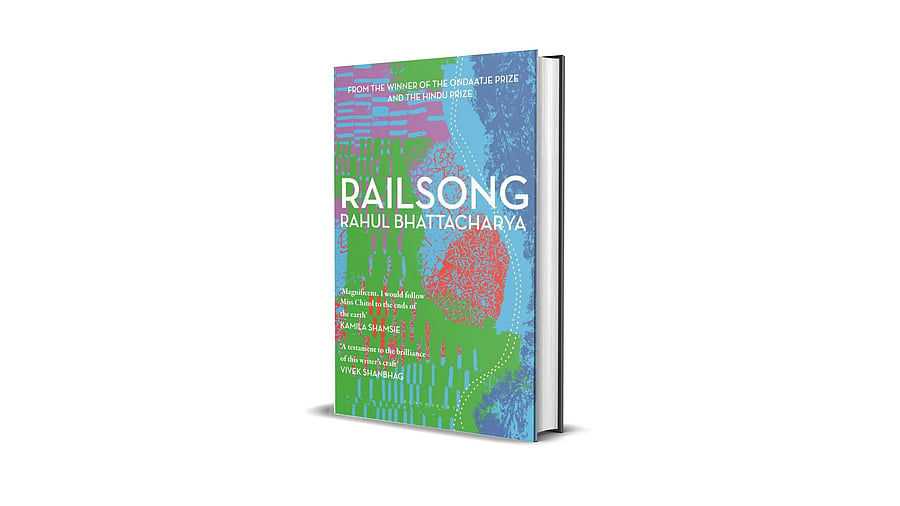
Railsong.
Railsong by Rahul Bhattacharya is a sweeping saga that combines personal narrative and social history while taking a fascinating deep dive into how the Indian Railways works. The beating heart of the story, however, is its indomitable main character, Charulata Chitol.
The story begins with Charu’s family moving to a railway township, Bhombalpur. Charu’s father works on the Light Machine Shop floor. It is 1961, and the census is being taken. Little Charu expresses an interest in counting. By the end, that is exactly what she will be doing as a government-appointed census-taker.
Bhombalpur will shape the early parts of Charu’s life. She will lose both her mother and grandmother, come of age and finally leave home at the age of 16. She will discover the world of books, and they will be her lifelong companion. External factors also affect her life, her family and the larger society they are part of. They will, unfortunately, experience drought and famine.
A countrywide railway strike will find its echo here. This will impact the Chitols, due to Charu’s father’s union activities, forcing them to go underground for a while. All of this will be the crucible in which Charu’s character is forged. Infused with a strong streak of independence, daring and rebellion, she also has the clarity to choose the life she wants to lead.
Refusing to spend her life as a domestic drudge and spurred by her father’s words to face her own struggles and battles to make something of herself, she does just that. She runs away from there to the city that was then called Bombay.
The next phase of her life unfolds in Bombay.
Much lies ahead for her there: an education she pursues in fits and starts, the ordeal of finding a place to stay and earn a living, and finally love. There will be men in her life, one of whom she will marry. It is refreshing how the author paints a picture of a woman who experiences and expresses sexual feelings, both outside the conventions of marriage and within. It never comes across as tawdry, even if the situations that Charu finds herself in sometimes are.
Most importantly, in her life coming full circle, when Charu’s father dies, she manages to secure a job at the railways on compassionate grounds.
Her job in the railways, first as a personnel clerk and later as a welfare inspector, allows the author to give a fascinating insight into how the system works. An officer tells her it is the Indian Railways that makes India; a huge amount of people and goods are transported to different parts of the vast country at what can be considered reasonable rates; many challenges are faced and overcome.
The author’s ode to the railways continues. We are told how the Indian Railways does not ‘see’ religion, caste, language, state or even weather. How the machinery of this huge behemoth is kept well-oiled and running by the large number of people who work in it. For those like Charu who do their job diligently, the challenges are many, but as the author shows, it is also a learning process, and an exposure to the many Indias which exist, and in Charu’s case, an eye-opener laced with understanding and empathy. It is a triumph of Bhattacharya’s writing that Charu’s perspective becomes ours. There is humour braided cleverly into the story, which works to leaven the dense narrative.
This is a writer who has listened and observed the quirks of people. The wit is gentle, directing our gaze towards an unpleasant habit that some men have of scratching their nether regions, or the tics that some people use in talking, or even at an annoying trait of character in someone. And at times it is wry, as when Charu and her friend, who get a job that is advertised as ‘smart girls required’, are then referred to by that moniker.
In this character-driven story, it is not only Charu but others, too, who are sharply delineated. The cast of characters is huge, but even the ones who are minor are deftly drawn. Charu’s father makes an impression. We can see how much Charu has inherited from him, a man of principles, wanting to shed conventions holding people back, who is against the caste system and a believer in the ideals of social justice. His humane outlook is reflected in his daughter. The sense of loneliness that often cloaks him does the same with Charu. He follows his own drum in how he conducts his life, as does his daughter.
We are carried effortlessly on the journey of Charu’s life, and we find that the railsong speaks as much to us as it does to Charu. ‘Literature, like water, leaves its mark,’ says Charu’s father. So does this illuminating book.